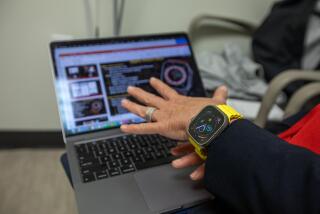Monitors Can Be Valuable for Heart Patients, Athletes
- Share via
WASHINGTON — If it’s important for you to know how fast your heart beats during exercise, doctors say a heart monitor can be valuable.
Knowing their heart rate can be crucial for cardiac patients trying to strengthen damaged circulatory systems, said Henry S. Miller, a cardiology professor at Wake Forest University’s Bowman Gray School of Medicine.
It can keep them from exercising so strenuously that they inadvertently exceed their safe range, or so lightly that the workout doesn’t increase their fitness, said Miller, who directs the Wake Forest Cardiac Rehabilitation Program.
Some people can get a quick, free check on their heart rate by taking their pulse for 10 seconds and multiplying by six, he said. “The ones who have difficulty counting their pulses--and some do--will benefit from some device,” Miller said.
Elite endurance athletes use the devices to monitor efficiency. Heart rate correlates closely with overall aerobic conditioning--the development of a muscle’s ability to use oxygen in burning fuel.
Exceeding the aerobic target can generate a buildup of lactic acid and other waste products, leaving the muscles sore, and making training harder. Remaining within the aerobic target range also lets an athlete exercise--and burn fat--longer.
“The monitor will take the guesswork out of your training,” said Philip Maffetone of Mahopac, N.Y., who trains Mark Allen, two-time winner of Hawaii’s Ironman triathlon. “The results are rather dramatic.”
However, he said, there’s scant academic research to establish that the value added by a monitor is as great as the trainers and athletes who use them believe.
Ordinary athletes who want to follow the stars’ example can find heart monitors as options on aerobic training equipment, or sold separately. But experts question the need for them.
“Although these are nice instruments that can be helpful for the healthy person interested in increasing their exercise, they are rarely necessary if the individual will listen to his or her body,” said Sam Fox, director of preventive cardiology programs at Georgetown University Medical Center.
If you are pushing yourself to the point at which you are sweating, and feel a mild, pleasant sense of fatigue, you’re doing it right, Fox said. If you still want a monitor, that’s a matter of personal choice, he said.
A monitor might be more helpful to people who travel to high altitudes or hot climates, said Jere H. Mitchell, professor of internal medicine and physiology at the University of Texas Southwestern Medical Center.
However, knowing how fast your heart beats doesn’t help that much if you don’t know how fast it should beat.
The American Heart Association’s guideline is 60 percent to 75 percent of your maximum, which it says can be approximated by subtracting your age from the number 220.
For a young, healthy person with no sign of heart trouble, the formula may be accurate enough. But for a sedentary, older person with some risk factors--high blood pressure, smoking or high cholesterol level--it may be way off. These people may need an exercise stress test.
And experts say some monitors are more accurate than others.





